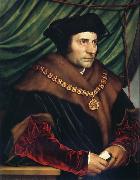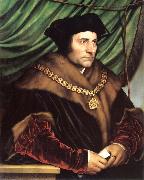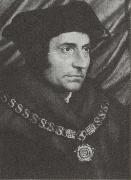
|
Hans holbein the younger
|
|||
|
|
|||
| b. 1497, Augsburg, d. 1543, London was a German artist and printmaker who worked in a Northern Renaissance style. He is best known as one of the greatest portraitists of the 16th century.[2] He also produced religious art, satire and Reformation propaganda, and made a significant contribution to the history of book design. He is called "the Younger" to distinguish him from his father, Hans Holbein the Elder, an accomplished painter of the Late Gothic school. Born in Augsburg, Holbein worked mainly in Basel as a young artist. At first he painted murals and religious works and designed for stained glass windows and printed books. He also painted the occasional portrait, making his international mark with portraits of the humanist Desiderius Erasmus of Rotterdam. When the Reformation reached Basel, Holbein worked for reformist clients while continuing to serve traditional religious patrons. His Late Gothic style was enriched by artistic trends in Italy, France, and the Netherlands, as well as by Renaissance Humanism. The result was a combined aesthetic uniquely his own. Holbein travelled to England in 1526 in search of work, with a recommendation from Erasmus. He was welcomed into the humanist circle of Thomas More, where he quickly built a high reputation. After returning to Basel for four years, he resumed his career in England in 1532. This time he worked for the twin founts of patronage, Anne Boleyn and Thomas Cromwell. By 1535, he was King's Painter to King Henry VIII. In this role, he produced not only portraits and festive decorations but designs for jewellery, plate, and other precious objects. His portraits of the royal family and nobles are a vivid record of a brilliant court in the momentous years when Henry was asserting his supremacy over the English church. Holbein's art was prized from early in his career. The French poet and reformer Nicholas Bourbon dubbed him "the Apelles of our time".[3] Holbein has also been described as a great "one-off" of art history, since he founded no school.[4] After his death, some of his work was lost, but much was collected, and by the 19th century, Holbein was recognised among the great portrait masters. Recent exhibitions have also highlighted his versatility. | |||
|
|
|||
|
Sir thomas more new4/Hans holbein the younger-676378.jpg Painting ID:: 31739 |
mk76 Dated 1527 Oil on panel 29 1/2x23 3/4in | ||
|
|
|||
|
Hans holbein the younger
|
|||
|
|
|||
| b. 1497, Augsburg, d. 1543, London was a German artist and printmaker who worked in a Northern Renaissance style. He is best known as one of the greatest portraitists of the 16th century.[2] He also produced religious art, satire and Reformation propaganda, and made a significant contribution to the history of book design. He is called "the Younger" to distinguish him from his father, Hans Holbein the Elder, an accomplished painter of the Late Gothic school. Born in Augsburg, Holbein worked mainly in Basel as a young artist. At first he painted murals and religious works and designed for stained glass windows and printed books. He also painted the occasional portrait, making his international mark with portraits of the humanist Desiderius Erasmus of Rotterdam. When the Reformation reached Basel, Holbein worked for reformist clients while continuing to serve traditional religious patrons. His Late Gothic style was enriched by artistic trends in Italy, France, and the Netherlands, as well as by Renaissance Humanism. The result was a combined aesthetic uniquely his own. Holbein travelled to England in 1526 in search of work, with a recommendation from Erasmus. He was welcomed into the humanist circle of Thomas More, where he quickly built a high reputation. After returning to Basel for four years, he resumed his career in England in 1532. This time he worked for the twin founts of patronage, Anne Boleyn and Thomas Cromwell. By 1535, he was King's Painter to King Henry VIII. In this role, he produced not only portraits and festive decorations but designs for jewellery, plate, and other precious objects. His portraits of the royal family and nobles are a vivid record of a brilliant court in the momentous years when Henry was asserting his supremacy over the English church. Holbein's art was prized from early in his career. The French poet and reformer Nicholas Bourbon dubbed him "the Apelles of our time".[3] Holbein has also been described as a great "one-off" of art history, since he founded no school.[4] After his death, some of his work was lost, but much was collected, and by the 19th century, Holbein was recognised among the great portrait masters. Recent exhibitions have also highlighted his versatility. | |||
|
|
|||
|
Sir Thomas More new11/Hans holbein the younger-232956.jpg Painting ID:: 38211 |
mk29 1528 Oil on oak panel 74.9x60.3cm | ||
|
|
|||
|
unknow artist
|
|||
|
|
|||
|
|
|||
|
Sir Thomas More new18/unknow artist-839868.jpg Painting ID:: 50840 |
mk216 A political and philosopher,humanist and author of the Famous Utopia | ||
|
|
|||
|
Also Buy::. For Following Paintings / Artists / Products, Please Use Our Search Online: |










